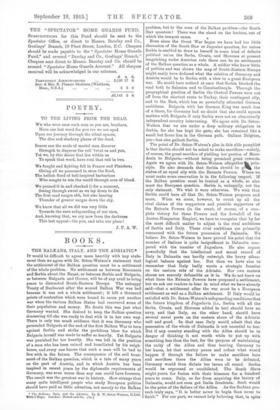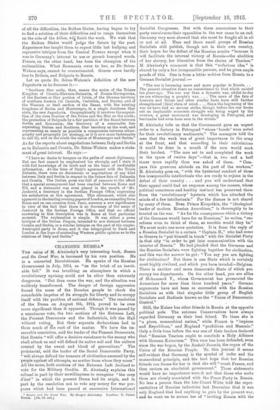BOOKS.
THE BALKANS, ITALY, AND THE ADRIATIC.* IT would be difficult to agree more heartily with any state- ment than we agree with Dr. Seton-Watson's statement that the settlement of the Balkan question must be a settlement of the whole problem. No settlement as between Roumania and Serbia about the Banat, or between Serbia and Bulgaria, or between Bulgaria and Greece, will be of any avail to bring peace to distracted South-Eastern Europe. The unhappy Treaty of Bucharest after the second Balkan War was had because it was not a whole settlement ; it left a thousand points of contention which were bound to cause yet another war when the various Balkan States had recovered some of their population and money. No doubt this was just what Germany wanted. She desired to keep the Balkan question simmering till she was ready to deal with it in her own way. There is only too much evidence that it was Germany who persuaded Bulgaria at the end of the first Balkan War to turn against Serbia and strike the perfidious blow for which Bulgaria herself was made to suffer so heavily. Yet Bulgaria was punished far too heavily. She was left in the position of a man who has been ruined and humiliated by his neigh- bours, and every one knows that such a man will be bad to live with in the future. The consequence of the evil treat- ment of the Balkan question, which is a tale of many years on the part of Austria, and in which Austria has been inspired in recent years by the diplomatic requirements of Germany, was even worse than any one could have foreseen. The result was the greatest war in history. How strange that many quite intelligent people who study European politics should have paid so little attention, not merely to the Balkan • The Balkan., Italy, and the Adriatic. By R. W. Seton•Watson, With 2 Mars. London; Nisbet sad Co. 118.1
problem, but to the crux of the Balkan problem—the South Slav question ! Ther•e was the cloud on the horizon, out of
which the tempest came. e Even since the Great War began we have had too little discussion of the South Slav or Jugoslav question, for unless Serbia is enabled to draw to herself in some kind of definite political union the Serbs, Croats, and Slovenes at present languishing under Austrian rule there can be no settlement of the Balkan question as a whole. A soldier who know little of politics and was shown the map of South-Eastern Europe might easily have deducted what the relation of Germany and Austria would be to Serbia with a view to a great European war. He would have noticed at once that Serbia blocked the road both to Salonica and to Constantinople. Through the geographical position of Serbia the Central Powers were cut off from the shortest route to Turkey, their contingent ally, and to the East, which has so powerfully attracted German ambitions. Bulgaria with her German King was much less of a thorn, for Germany had no doubt that she could square matters with Bulgaria if only Serbia were not an obnoxiously independent country intervening. We agree with Dr. Seton- Watson that we are under a deep military obligation to Serbia, for she has kept the gate; she has remained like a small but fierce lion in the German path. Gallant Belgium, yes—but also gallant Serbia.
The point of Dr. Seton-Watson's plea in this able pamphlet is that Serbia should not be asked to make sacrifices—mainly, of course, the great sacrifice of yielding her portion of Mace- donia. to Bulgaria—without being promised great rewards. Again we agree with Dr. Seton-Watson altogether prin- ciple. He also demands that Serbia should be gi the status of an equal ally with the Entente Powers. Where we must make some reservation is in the following respect. If the Balkan question must be treated as a whole, so also must the European question. Serbia is, unhappily, not the only claimant. We wish it were otherwise. We wish that Serbia could have all that Dr. Seton-Watson proposes and more. When we come, however, to count up all the rival claims of the supporters and possible supporters of the Entente Powers (in the event, of course, of a com- plete victory for these Powers and the downfall of the Austro-Hungarian Empire), we have to recognize that by far the most difficult matter to adjust is the rival ambitions of Serbia and Italy. These rival ambitions are primarily concerned with the future possession of Dalmatia. We believe Dr. Seton-Watson to have proved his point that the number of Italians is quite insignificant in Dalmatia com- pared with the number of Jugoslays. He also argues powerfully that the intellectual and moral record of Italy in Dalmatia can hardly outweigh the heavy ethno- logical balance against her. But then we have also to remember that Italy badly wants a strategic frontier on the eastern side of the Adriatic. Her own eastern shores are scarcely defensible as it is. We do not know on what lines the Entente Powers have proposed a settlement, but we ask our readers to bear in mind what we have already said—that a settlement after the war must be a European settlement as well as a Balkan settlement. If Italy would be satisfied with Dr. Seton-Watson's safeguarding conditions that the future kingdom of Jugoslavia (i.e., Serbia with all the Serbs, Croats, and Slovenes added to her) should have no navy, and that Italy, on the other hand, should have several naval ports on the eastern shore of the Adriatic well and good. In that case Italy would admit that the possession of the whale of Dalmatia is not essential to her. But if any country standing with the Allies should be in danger of thinking it not worth while to put up with something leas than the best, for the purpose of maintaining the unity of the Allies and thus beating Germany to her knees, let that country pause and reflect what would happen if through the failure to make sacrifices here and sacrifices there the Allies were to be defeated. Germany would then dictate her terms all round. Serbia would be repressed or annihilated. The South Slave might yearn for fusion with their kinsmen for a hundred years to come. Italy, so far from acquiring the luxury of Dalmatia, would not even get Italia Irredenta. Such would be the price of the failure of the Allies. As the Serbian pro- verb truly says, " It is better never to begin than never to finish." For our part, we cannot help believing that, in spite
of all the difficulties, the Balkan States, having begun to try to find a solution of their difficulties and to range themselves on the side of the Allies, will finish the work. We wish that the Balkan States would judge the future by the past. Experience has taught them to expect little but bullying and repressive intrigue from the Central Powers except when it was to Germany's interest to use or permit honeyed words. France, on the other hand, has been the champion of the nationalities. What Roumania owes to her, as Dr. Seton- Watson says, cannot be overestimated. Greece owes hardly less to Britain, and Bulgaria to Russia.
Let us quote Dr. Seton-Watson's definition of the new Jugoslavia as he foresees it :— " Southern Slav unity, then, means the union of the Triune Kingdom of Croatia-Slavonia-Dalmatia, of Bosnia-Herzegovina, of the Eastern or Slav portion of Istria, of the Slovene territory of southern Austria (in Carniola, Carinthia, and Styria), and of the Western or Serb section of the Banat, with the existing kingdoms of Serbia and Montenegro, in a single Southern. Slav state, the new Jugoslavia. Geographically it involves the acquisi- tion of the river frontier of the Drava and the Mur on the north ; the protection of Belgrade by a fair partition of the Banat between Serbia and Roumania; the discovery of a reasonable line separating Italian and Southern Slav territory on the west, and representing as nearly as possible a compromise between ethno- graphy and geography (or strategy, as it is now more fashionable to call it), aad on the south the union of Montenegro and Serbia."
As for the reports about negotiations between Italy and Serbia as to Dalmatia and Croatia, Dr. Solon-Watson makes a state- ment of great interest. He says
"I have no desire to trespass on the paths of secret diplomacy. But one fact cannot be emphasized too strongly, and I state it with full knowledge of its truth and on the basis of irrefutable information. At the time of Italy's agreement with the Triple Entente, there were no discussions or negotiations of any kind between Italy and Serbia in respect to the future fate of Dalmatia and Croatia. The Italian press was full of rumours to the effect that a special arrangement had been reached between Rome and Nil, and a statement was even placed in the mouth. of 'Mr. Jankovid, a Secretary in the Sorbian Foreign Office,' expressing his satisfaction at this agreement. This statement, which also appeared in the leading evening papers of London, as emanating from Rome and on one occasion from Paris, assumes a new significance in view of the fact that there is no Secretary of the name of Jankovid in the Serbian. Foreign Office, and that no official answering to this description was in Rome at that particular moment. The explanation is simple. It was either a press intrigue of the Italian Jingoes, intended to sow distrust between Croatia and Serbia, or a similar intrigue on the part of the crypto- Austrophil party in Rome, and it was telegraphed to Paris and London in the hope of misleading Western public opinion as to the relations of Italy and Serbia."



































 Previous page
Previous page